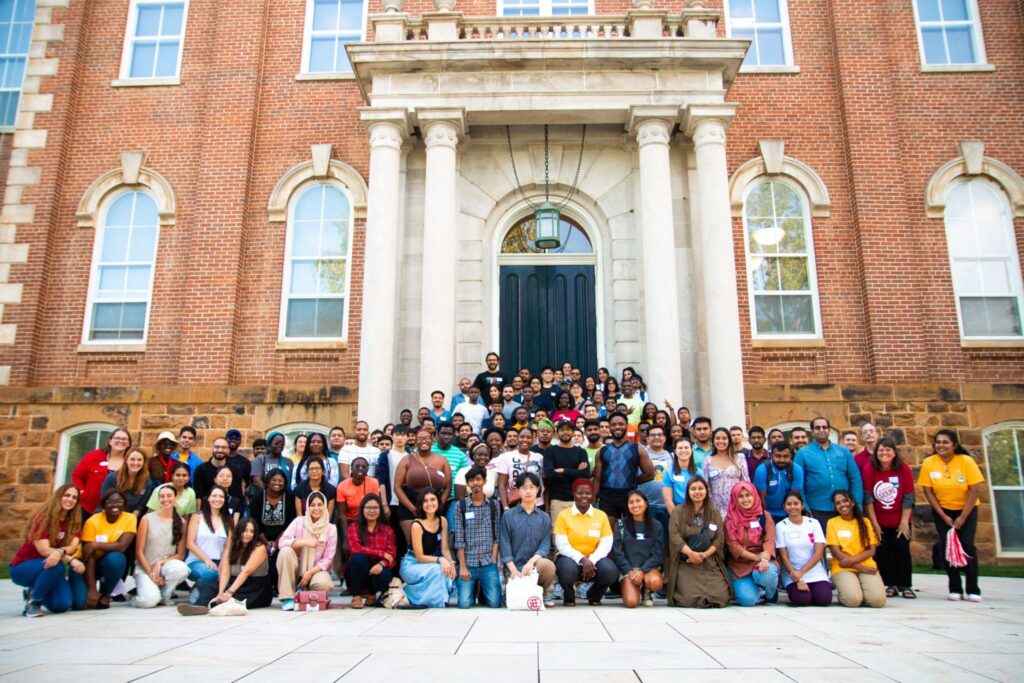Finally, I survived my first week as a PhD student. It’s been a super busy week with tons of tasks to complete. From getting through my immigration basics, sorting out my medicals, opening a US bank account, getting a US line, attending a long list of orientations, activating my student ID, making cool new friends on campus, sorting out my GA, learning my way around the campus, sorting out my documentation, staying healthy and surviving in between. Nothing prepares you for the journey ahead. In between, I’m totally clueless about what I’m doing. I’m just trying to figure things out as I progress through these hurdles.

PhD is no joke – most times you are expected to figure things out yourself. The purpose of this blog is to document my journey so someone reading it will find it easier to navigate. It doesn’t matter what field you are in; I will try to make it neutral for everyone. My advice is once you are on campus, ask a lot of questions and be shameless about it. No one will hold your hand through this journey – you are expected to figure things out yourself. I’m not claiming to be an expert in this – in fact, I’m still clueless.
To start with, let’s say you are a first-year PhD student; there are a few steps you need to take to set yourself ahead. A good example is having a blog. You can tell that this blog is dedicated to my entire PhD journey. I’m able to share this post because I operate this blog. If you can, it pays to learn how to blog.
As a first-year PhD student, there are several platforms you should consider registering on to enhance your academic journey, manage your research, and connect with the academic community. Here are some key platforms and tools you might find useful:
Research and Literature Management
Zotero:
Zotero is a free reference management tool that helps you organize your research papers and references. It’s particularly useful for managing citations and creating bibliographies. Here are some key features and aspects of Zotero:
- Reference Management: Allows you to save and organize citations, full-text articles, webpages, and other research materials. Supports a wide range of file types, including PDFs, images, audio, and video files.
- Browser Integration: Offers browser extensions that can automatically capture citation information from websites, online library catalogs, and databases.
- Citation Generation: Can generate in-text citations and bibliographies in many different citation styles (APA, MLA, Chicago, etc.). Integrates with word processors like Microsoft Word and Google Docs.
- Collaboration Features: Allows users to create group libraries to share references and collaborate on research projects.
- Syncing: Provides free online syncing of your library across multiple devices.
- Tagging and Search: Offers powerful search capabilities and allows you to tag items for easy organization.
- PDF Management: Includes a built-in PDF reader with annotation tools.
- Open-Source Nature: Being open-source means it’s continually improved by a community of developers and users.
- Platform Compatibility: Works on Windows, Mac, and Linux operating systems.
Mendeley:
Mendeley is a reference management software and academic social network that offers several features to help researchers organize their work, collaborate with others, and discover new research. Here’s a more detailed look at Mendeley:
- 1. Reference Management: Allows you to store, organize, and search through your research papers and references. Automatically extracts metadata from PDFs, though you may need to check for accuracy. Enables you to add notes and tags to your references for easy retrieval.
- 2. PDF Reader and Annotation: Built-in PDF viewer lets you highlight text and add sticky notes to papers. Annotations are searchable and can be shared with collaborators.
- 3. Citation Tool: Integrates with Microsoft Word and LibreOffice to insert citations and create bibliographies. Supports thousands of citation styles and allows you to switch between them easily.
- 4. Web Importer: Browser plugin that allows you to save references and PDFs directly from your web browser.
- 5. Mendeley Web: Web version of the software that syncs with your desktop application. Allows you to access your library from any computer with internet access.
- 6. Collaboration Features: Enables you to create private groups to share papers and collaborate with team members. Public groups are available for broader discussions and paper sharing.
- 7. Mendeley Suggest: Recommends papers based on your library and reading habits.
8. Mendeley Data: A separate but related platform for publishing and finding research data.
9. Social Networking: Allows you to create a research profile and connect with other researchers. You can follow other researchers and see what they’re reading and publishing.
10. Mobile App: Available for iOS and Android, allowing you to access your library on the go.
11. Storage: Offers 2GB of free storage for PDFs and other documents, with options to upgrade for more space.
12. Integration with Other Tools: Can be integrated with other research tools like Overleaf for LaTeX document preparation.
While Mendeley offers many useful features, it’s worth noting that it was acquired by Elsevier in 2013, which has led some researchers to prefer open-source alternatives like Zotero. The choice between reference managers often comes down to personal preference and specific needs.
Networking and Professional Development
LinkedIn:
LinkedIn: A professional networking site that allows you to connect with other academics, share your research, and explore career opportunities.
ResearchGate
- ResearchGate: ResearchGate is a professional network for scientists and researchers. It’s designed to help academics connect, share their work, and discover new research. Here’s a comprehensive overview of ResearchGate:
- Profile Creation: Users create academic profiles highlighting their research, publications, and expertise. Profiles can include education, work history, skills, and research interests.
- Publication Sharing: Researchers can upload their papers, datasets, conference presentations, and other research outputs. It allows for sharing both published works and preprints.
- Citation Tracking: Tracks citations of your work within the ResearchGate ecosystem. Provides metrics like RG Score and h-index based on your publications and interactions on the platform.
- Networking: Allows you to follow other researchers and see their updates. You can connect with colleagues, collaborators, and others in your field.
- Q&A Platform: Researchers can ask and answer questions related to their field. This feature facilitates knowledge sharing and problem-solving within the scientific community.
- Job Board: Includes a section for scientific and academic job postings.
- Project Collaboration: Enables creation of project pages where researchers can share updates, data, and findings with collaborators or the public.
- Request Full-text: If a full paper isn’t available, users can request it directly from the author.
- Updates and Recommendations: Provides personalized updates on new publications in your field. Suggests relevant papers, researchers, and jobs based on your profile and activity.
- Analytics: Offers insights into who’s reading your work, where they’re from, and which of your papers are most popular.
- Open Access Advocacy: Encourages open access publishing and sharing of research data.
- Institutional Profiles: Universities and research institutions can have their own profiles, showcasing their researchers and output.
Google Scholar:
Google Scholar: Google Scholar is a free academic search engine and bibliographic database provided by Google. It’s widely used by researchers, students, and academics. Here’s a comprehensive overview of Google Scholar:
- 1. Literature Search: Allows you to search for scholarly literature across various disciplines and sources. Indexes peer-reviewed papers, theses, books, preprints, abstracts, and technical reports.
- 2. Citation Tracking: Tracks citations to publications, allowing you to see who has cited a particular work. Provides citation metrics like the h-index for individual researchers.
- 3. Google Scholar Profile: Researchers can create a profile showcasing their publications and citation metrics. Profiles can be public or private.
- 4. “Cited by” Feature: Shows a list of papers that have cited a particular publication.
- 5. Related Articles: Suggests articles related to your search or a specific paper.
- 6. Library Links: Can be linked to your institution’s library, showing you where you have full-text access.
- 7. “My Library” Feature: Allows you to save articles for later reading or reference.
- 8. Alerts: You can set up email alerts for new papers on specific topics or citations to your work.
- 9. Journal Ranking: Provides journal rankings based on their h5-index and h5-median.
- 10. Full Text Links: Often provides links to full-text versions of papers, including open access versions.
- 11. Advanced Search: Offers options to refine searches by date, author, publication, etc.
- 12. Citation Styles: Provides citation information in various formats (MLA, APA, Chicago, etc.).
- 13. Google Scholar Button: A browser extension that allows quick access to Google Scholar from any webpage.
- 14. Integration with Other Google Services: Works seamlessly with other Google products like Gmail for alerts.
- 15. “Stand on the shoulders of giants”: This is Google Scholar’s motto, emphasizing its role in building upon existing research.
- For a PhD student, setting up a Google Scholar profile early can be beneficial. It helps you track your publications and citations as you progress in your academic career. Additionally, using Google Scholar effectively can significantly aid in your research process.
ORCID:
ORCID (Open Researcher and Contributor ID) is a non-profit organization that provides a unique digital identifier for researchers and scholars. Here’s a comprehensive overview of ORCID:
- 1. Unique Identifier: ORCID provides each researcher with a 16-digit unique identifier (e.g., 0000-0002-1825-0097). This ID acts as a persistent digital identifier that distinguishes you from every other researcher.
- 2. Disambiguation: Helps solve the problem of name ambiguity in research and scholarly communications. Particularly useful for researchers with common names or who have changed names.
- 3. Integration: Widely integrated with various systems including publishers, funders, and institutions. Many journals now require or encourage ORCID IDs during manuscript submission.
- 4. Controlled by You: You control what information is connected to your ORCID ID and who can see it. You can add, edit, or remove information at any time.
- 5. CV/Resume Function: Acts as a centralized registry of your professional information. Can include your education, employment, publications, grants, and other research outputs.
- 6. Automatic Updates: Can be set up to automatically update your record when you publish new work or receive grants.
- 7. Privacy Options: Allows you to set different levels of privacy for different information in your profile.
- 8. Open Source: ORCID is committed to open source software and open data.
- 9. International Recognition: Recognized and used globally, crossing geographic and discipline boundaries.
- 10. Time-Saving: Reduces time spent repeatedly entering the same information for different systems.
- 11. Funding and Publishing: Many funding bodies and publishers now use ORCID in their workflows. Some funders require ORCID IDs for grant applications.
- 12. Institutional Connections: Many universities and research institutions encourage or require ORCID use. Some institutions can help populate your ORCID profile with your affiliations and works.
- 13. API Access: Provides API access, allowing developers to create applications that interact with ORCID data.
- 14. No Cost: Free for individual researchers to obtain and maintain an ORCID iD.
- 15. Persistent: Your ORCID iD remains constant throughout your career, even if you change names, institutions, or fields.
ORCID is becoming increasingly important in the academic world. It helps ensure that your work is correctly attributed to you, simplifies the reporting of your research outputs, and can make it easier to apply for grants or submit articles for publication.
For a first-year PhD student, setting up an ORCID iD early in your career can be beneficial as it provides a foundation for managing your professional identity as a researcher from the start.
Writing and Collaboration
- Overleaf: An online LaTeX editor that is ideal for writing research papers and theses, especially if your work involves complex mathematical equations or formatting.
- Google Docs: For collaborative writing and sharing documents with your peers or supervisors, Google Docs is a widely used platform.
Online Communities and Support
- Reddit: Subreddits like r/PhD and r/AskAcademia offer community support where you can discuss challenges and share experiences with fellow PhD students.
- PhD Success Community: This community provides support, motivation, and resources for PhD students, including live Q&As and social events.
- Virtual Writing Retreats: These are online writing communities that help you stay motivated and productive by providing structured writing sessions.
Personal Website
GitHub Pages:
- GitHub Pages: GitHub is a web-based platform for version control and collaboration using Git. While it’s primarily associated with software development, it has become increasingly valuable for PhD students across various disciplines. Here’s an overview of GitHub’s relevance for PhD students:
- 1. Version Control: Allows you to track changes in your research code, manuscripts, or data analysis scripts over time. Enables you to revert to previous versions if needed.
- 2. Collaboration: Facilitates collaboration with supervisors, colleagues, or collaborators on coding projects or paper drafts. Enables easy sharing of your work with others.
- 3. Open Science: Supports open science practices by allowing you to make your research code and data publicly accessible. Increases research transparency and reproducibility.
- 4. Project Management: Offers tools like Issues and Projects for tracking tasks, bugs, and project progress.
- 5. Documentation: README files and wikis can be used to document your research methods, data, or code.
- 6. Backup: Serves as an off-site backup for your research materials.
- 7. Showcasing Work: Acts as a portfolio of your coding skills and research projects. Can be shared with potential employers or collaborators.
- 8. Learning Resource: You can learn from others’ code and contribute to open-source projects in your field.
- 9. Integration with Other Tools: Integrates with many research tools and platforms like Jupyter Notebooks, RStudio, and more.
- 10. GitHub Pages: Allows you to create a free website to showcase your research or blog about your PhD journey.
- 11. Large Community: Access to a large community of researchers and developers for support and collaboration.
- 12. Continuous Integration: Can be used to automatically run tests or analyses when you update your code.
- 13. Data Analysis Workflows: Useful for managing and sharing data analysis pipelines.
- 14. Teaching and Supervision: Can be used to share materials with students or for supervisors to track students’ progress.
- 15. Version Control for Writing: While not as user-friendly as some dedicated writing tools, it can be used for version control of manuscripts.
- However, it’s important to note that there’s a learning curve to using Git and GitHub effectively. It’s also crucial to be mindful of what you make public, especially regarding sensitive data or unpublished research.
WordPress:
WordPress: Another option for building a personal site to showcase your CV, publications, and research interests. You can already guess I’m making use of WordPress for this post
By leveraging these platforms, you can enhance your research efficiency, build a professional network, and find support throughout your PhD journey.










Leave a Reply